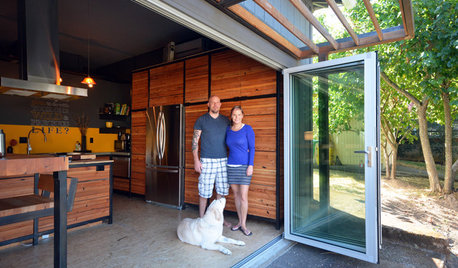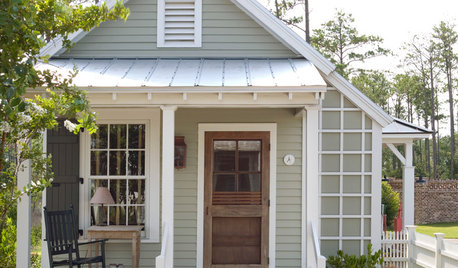Refinance mortgage & equity
MoAtWork
21 years ago
Related Stories

FEEL-GOOD HOME10 Ways to Get That Casual Chic Look
Make your home look effortlessly elegant by balancing rustic and refined, mixing textures and having a little fun
Full Story
HOUZZ TOURSHouzz Tour: Picture-Perfect Simplicity
It’s like camping out in a catalog sometimes at this classic farmhouse — Pottery Barn and other retailers love it for photo shoots
Full Story
LIFECould You Be a Landlord?
Sure, the extra income would be great. But jumping blindly into owning a rental property could be disastrous. Here's what you need to know
Full Story
MY HOUZZHouzz TV: A Couple’s Garage Becomes Their Chic New Home
Portland, Oregon, homeowners find freedom in a city-approved garage home with DIY industrial flair
Full Story
DESIGN PRACTICEDesign Practice: Start-up Costs for Architects and Designers
How much cash does it take to open a design company? When you use free tools and services, it’s less than you might think
Full Story
LIFE10 Reasons to Be Happy You’re a Renter
Homeownership has many benefits, but there are upsides to not owning a home too
Full Story
MOVINGHow to Avoid Paying Too Much for a House
Use the power of comps to gauge a home’s affordability and submit the right bid
Full StoryGREEN BUILDING11 Reasons to Live in a House of Straw
Don’t be fooled by the old folk tale. Straw bales are a strong, functional and good-looking building material
Full Story
REMODELING GUIDESHouzz Survey Results: Remodeling Likely to Trump Selling in 2014
Most homeowners say they’re staying put for now, and investing in features to help them live better and love their homes more
Full Story
SMALL SPACES8 Benefits of Cottage Living
Scale back to dial up your quality of life, save money and more
Full StorySponsored
More Discussions



blincoln
dave_donhoff
Related Discussions
Combining first mortgage with home equity loan
Q
What to do inherited second home w/ mortgage and equity loan?
Q
When to refinance mortgage?
Q
Home Equity Loan/2nd Mortgage???
Q
cowboyind
dave_donhoff
cowboyind
dave_donhoff
MoAtWorkOriginal Author
dave_donhoff
MoAtWorkOriginal Author
landmarker
blincoln
dave_donhoff
landmarker
dave_donhoff
cube1067
dave_donhoff
MoAtWorkOriginal Author
landmarker
maxwell
MoAtWorkOriginal Author
landmarker
MoAtWorkOriginal Author
landmarker
maxwell
MoAtWorkOriginal Author
dave_donhoff
MoAtWorkOriginal Author
joyfulguy
MoAtWorkOriginal Author
joyfulguy